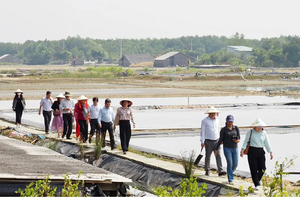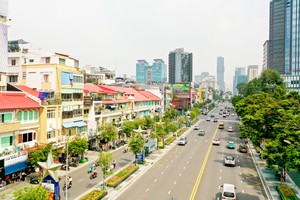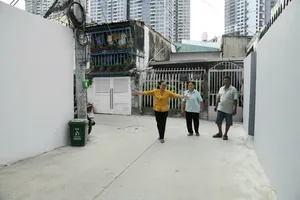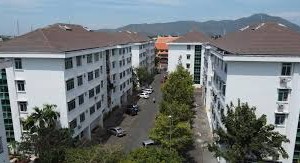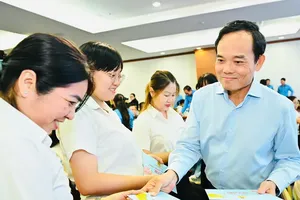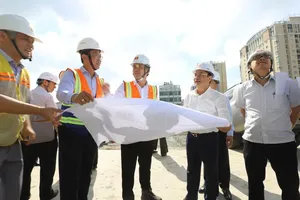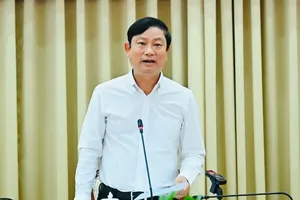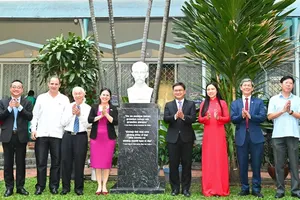
Creating new foundation for social welfare
In a morning of early November, the hall of the Tan My Ward People’s Committee (HCMC) was packed for the launch ceremony of the 2025 “For the Poor” peak month. The program felt less like a bureaucratic event and more like a warm, compassionate gathering, where the government, the Fatherland Front, and businesses joined hands to provide livelihoods and share the burden with those still struggling in life.
One of the beneficiaries was 58-year-old Pham Thi Kim Lan from Alley No.103 on Nguyen Thi Thap Street. Sitting in the back row, her calloused hands clutching the invitation, she waited. When her name was called to step onto the stage and receive a sugarcane juice cart, Ms. Lan grasped the hand of the Fatherland Front official, her eyes red with emotion. “I am so happy,” she said. “Now that I have a stable means of making a living, I will try my best to take care of my husband and grandchildren.”
Alongside receiving livelihood tools, disadvantaged households needing capital for production or job creation are supported by the locality through entrusted capital from the city budget. This allows the Vietnam Bank for Social Policies to offer preferential loans under the mechanism of Resolution 98.
In the 2023-2025 period, HCMC reportedly allocated nearly VND4.7 trillion (US$185 million) from the budget for preferential loans to support poverty reduction and job creation under this mechanism. Therefore, as HCMC proposes amendments to Resolution 98, local authorities are eager to maintain these vital social welfare policies.
Chairwoman Tran Thi Thuy Ha of the Vietnam Fatherland Front – Tan My Ward Branch views current livelihood support as merely the starting step, hoping the amended Resolution 98 will catalyze key changes for sustainable poverty reduction.
Nguyen Phuc Duc from the Party Building Office of Tang Nhon Phu Ward (HCMC) highlighted the intensifying grassroots workload under the new two-tier model. He cited Resolution 98’s additional income policy as a vital stabilizer for state officials. With base salaries often insufficient against HCMC’s rising costs, he confided that this financial supplement helps alleviate economic burden, enabling officials to dedicate themselves fully to public service.
Motivation to consolidate staff quality
After more than two years of implementation, HCMC has utilized the mechanism of using surplus salary reform sources, balancing over VND28 trillion ($1.1 billion) for additional income expenditures. Simultaneously, it has reserved about VND17 trillion ($644.5 million) from surplus salary reform sources for development investment.
According to HCMC Department of Home Affairs Director Pham Thi Thanh Hien, the expenditure of additional income under Resolution 98 has achieved many positive results, contributing to promoting civil service reform in HCMC.
To ensure transparency and avoid a “leveling down” approach, the city has deployed regulations to evaluate and classify officials’ work quality scientifically and objectively. This has created motivation, consolidated trust, and encouraged the cadre to strive to overcome difficulties and complete assigned tasks well.
In mid-November, the HCMC People’s Council passed Resolution No. 27/2025/NQ-HDND, extending the additional income policy city-wide to bolster civil servant motivation. Grassroots feedback confirms this measure significantly enhances staff quality and public service efficiency.
Concurrently, HCMC leverages Resolution 98 to allocate public capital for poverty reduction loans, untying critical lending knots amidst business contractions. The People’s Committee assesses that these preferential loans effectively curb “black credit” and unemployment, empowering workers to generate income and stabilize their lives.
The Ministry of Finance acknowledged Resolution 98’s profound impact in the 2023-2025 period, particularly through capital allocation for poverty reduction and job creation loans. These measures are pivotal for HCMC's 2025 target: virtually eliminating poor households by national standards and reducing them below 0.5 percent by city standards.
This is particularly meaningful in the context of business struggles leading to job losses. Furthermore, HCMC has expanded the beneficiaries of additional income, creating even greater motivation for the city’s team of officials, civil servants, and other employees in the city.
Nguyen Quoc Dung, a retired official in Hiep Thanh 8 Neighborhood of Phu Loi Ward shared that the amendment and supplementation of Resolution 98 should focus on specific development mechanisms in the fields of culture, health, education, and social security.
Within this, it is essential to design more specific, flexible policies to care for the poor and vulnerable, helping them better access housing, jobs, healthcare, education for their children, and basic services. Particular attention should be paid to policies for retired officials and the elderly. This will create a solid foundation helping HCMC develop sustainably in both breadth and depth, while consolidating trust and the great unity bloc among the people.
Nguyen Ngoc Dung, Head of Culture and Social Affairs Office in Hoa Loi Ward affirmed that Resolution 98’s income policy improves living standards and fosters peace of mind, motivating officials to proactively innovate for the people. However, acknowledging the pressure on agency heads, she proposed that higher levels calculate specific responsibility allowances commensurate with commune-level leadership positions in the new situation.
Tran Thi Ha, a worker in Thuan An Ward, described her finances as fragile, with rent and essentials consuming her salary. Homeownership remains impossible to her. Recounting the heartache of her family’s cramped place where her rented room serves as kitchen, living room, bedroom, and study corner for the kids, she hopes the amended Resolution 98 will prioritize wage increases and social housing, finally enabling workers to achieve the dream of settling down.
